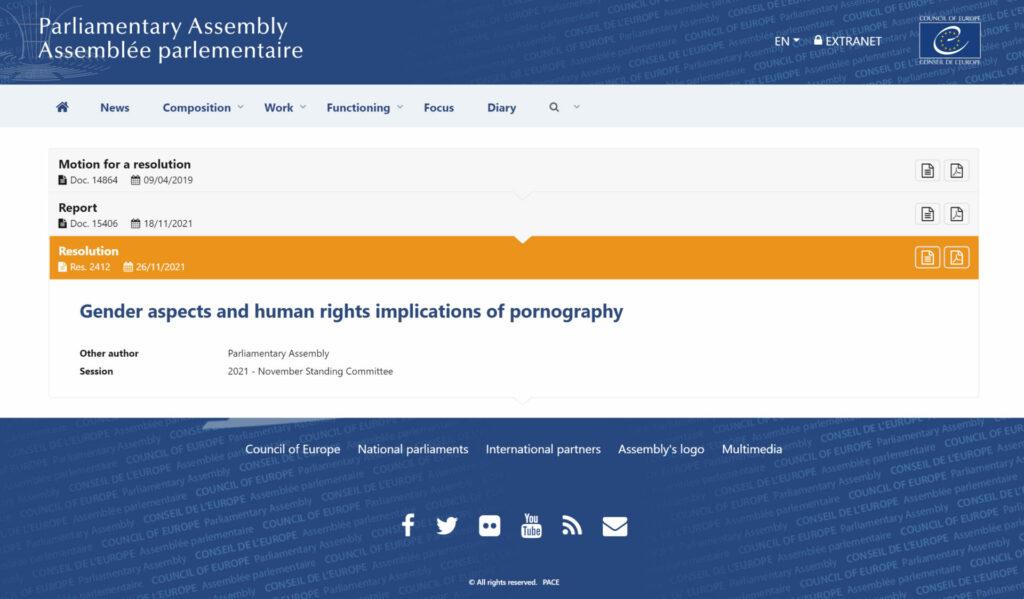MPs at Council of Europe PACE set out recommendations on the human rights implications of pornography
In a recommendation published last November 26th, the Parliamentary Assembly of the Council of Europe (PACE) is calling for comprehensive sexuality education in schools to become “the main source of information on sexuality for young people”, thus helping prevent the spread of unreliable and potentially harmful information via pornography.
Adopting a resolution based on the report by Frank Heinrich (Germany, EPP/CD) on the gender aspects and human rights implications of pornography, the Assembly’s Standing Committee said such material often engendered and perpetuated stereotypes by “conveying an image of women as subordinate to men, as objects and trivialising violence against women”.
It set out steps to counter the “negative and degrading image” of women portrayed in pornography, such as sexuality education, critical thinking tools for young people, and greater support for parents to deal with cyber sexism, and made a series of recommendations on the production, distribution, and consumption of pornography.
Anti-porn filters should be activated by default on all new computers and portable devices, internet providers should enable customers to clearly opt-in or out of access to such material, age-verification should be a legal obligation, and porn websites should carry warnings about potential harm. Pornography should be banned in the workplace, and employers required to install blocking filters.
The consent of all those depicted should be strictly verified, while providers should be required to collect the identities and contacts of everyone who uploads public pornographic material, the committee said. “Revenge pornography” should be criminalised, and states should consider extending existing bans on “the glorification of criminal acts” to cover violent pornography.
Meanwhile, the rights of all involved in the production of pornography, especially women and in particular performers, should be protected, with safe and dignified work conditions and fair remuneration.

Gender aspects and human rights implications of pornography
Resolution 2412 (2021) | Provisional version
Author(s):
Parliamentary Assembly
Origin
Text adopted by the Standing Committee, acting on behalf of the Assembly, on 26 November 2021 (see Doc. 15406, report of the Committee on Equality and Non-Discrimination, rapporteur: Mr Frank Heinrich).
1. Pornography is ubiquitous and easily accessible, particularly online. It is estimated that over half of all internet traffic is related to pornography and sex, and a large proportion of the population consults pornographic material. This tendency is claimed to have increased during the Covid-19 pandemics.
2. Research shows that pornography contributes to shaping people’s mindsets on sexuality and perceptions of gender roles, often engendering and perpetuating stereotypes thereby undermining gender equality and women’s self-determination by conveying an image of women as subordinate to men, as objects and trivialising violence against women. Young people are particularly exposed to this risk, as they rely on pornography as a source of information on sexuality for lack of unbiased, reliable information, due to the insufficient comprehensive sexuality education in school curricula.
3. The Parliamentary Assembly expresses its full support to Committee of Ministers Recommendations CM/Rec(2019)1 on preventing and combating sexism, which invites the governments of member States to “promote a gender equality perspective, as well as the development of critical thinking for the countering of sexism in the content, language and illustrations of toys, comics, books, television, video and other games, online content and films, including pornography, which shape the attitudes, behaviour and identity of girls and boys”, and CM/Rec(2013)1 on gender equality and media. Implementing the proposals put forward in these recommendations would allow to address the negative and degrading image that pornography portrays of women.
4. Already in 2011, in its Resolution 1835 (2011) “Violent and extreme pornography”, the Assembly considered that “this type of pornography further erodes the conditions for achieving effective gender equality, alongside other forms of hard and soft pornography, the widespread use of sexualised images of women for commercial purposes and the portrayal of gender stereotypes by the media and the entertainment industry.”
5. The Assembly reiterates that, while freedom of expression is a pillar of democratic societies and a right guaranteed by the European Convention on Human Rights (ETS No. 5), it is possible to set limits to this right when they are prescribed by law and are necessary in the interests of, amongst others, the prevention of crime, the protection of morals and the protection of the rights of others.
6. The Assembly considers that the human rights of people involved in the production of pornography, especially women and in particular performers, should be protected, and that self-determination, safe and dignified work conditions and fair remuneration should be guaranteed.
7. The Assembly notes that pornographic content is increasingly being created privately, by individuals not part of specialised production companies and distributed electronically. This calls for particular caution and for measures regulating the distribution of such content. The self-determination of people involved in the production and the consent of all those being depicted are paramount and must be strictly verified. “Revenge porn”, or the non-consensual dissemination, by email, phone messaging, social media or any other means of intimate and sexual images to embarrass and humiliate the persons depicted, is particularly concerning, and should be effectively prosecuted.
8. The Assembly considers that comprehensive sexuality education is a crucial part of young people’s preparation to adult life. It should be part of all school curricula and be age-appropriate, medically accurate and evidence-based. Sexuality education should cover issues including contraception and the prevention of sexually transmitted diseases, gender equality, gender norms and stereotypes, prevention of and protection from sexual, gender-based and intimate partner violence, sexual orientation and gender identity and expression, self-determination and consent in relationships and personal interaction.
9. Comprehensive sexuality education should be the main source of information on sexuality for young people, which would prevent the spread of unreliable and potentially harmful information by other sources such as pornography. Media education, aiming to improve interpretation skills and the understanding of written and audiovisual material, may also help to prevent the risk of harmful effects of pornography on the image of women.
10. In light of these considerations, the Assembly calls on member and observer States, as well as Partners for Democracy:
10.1 to fully enforce Committee of Ministers Recommendations CM/Rec(2019)1 on preventing and combating sexism and CM/Rec(2013)1 on gender equality and media;
10.2 as regards education, information and awareness raising, to:
10.2.1 ensure that age-appropriate, scientifically accurate, comprehensive sexuality education is part of all school curricula and mandatory for all pupils, and that children cannot be withdrawn from it. Sexuality education programmes should define, identify and explain the nature of pornography and specify its health, ethical, legal and gender equality implications. They should also highlight that pornography cannot replace reliable sources of information on sexuality and that it may convey inaccurate messages on gender roles, perpetuating gender stereotypes and fostering sexual violence and other forms of gender-based violence;
10.2.2 introduce out-of-school comprehensive sexuality education programmes, similar in content to in-school programmes but open to school-age children who do not attend school and young people above school age;
10.2.3 promote media education as part of school and out of school educational activities and ensure that it covers gender issues including gender stereotypes, sexism and the trivialisation of gender-based violence through pornography, advertising, entertainment and media in general;
10.2.4 introduce warning label systems requiring pornographic websites to display a notice warning about the potential harms of pornography use, similar to alcohol, smoking or online gambling warning labels;
10.2.5 consider introducing measures and tools to enhance the skills of parents to deal with cybersexism and internet pornography, as recommended in Committee of Ministers Recommendations CM/Rec(2019)1;
10.3 as regards data and image protection, to:
10.3.1 effectively enforce regulations on personal data and personal image protection, including in the area of online distribution of pornography;
10.3.2 ensure that all those depicted or otherwise participating in the production of pornographic content have given their free and informed consent to its distribution, in particular by requiring producers to prove verified consent before any image is made public;
10.3.3 within the limits of regulations on the use of private data, require online pornography providers to collect and store the identity and contact details of persons uploading pornographic material for public diffusion, with a view to facilitating criminal prosecution in cases where participants have not consented to diffusion or the material originates from trafficking in human beings, child abuse or other criminal activity;
10.4 as regards criminal law and other legal provisions, to:
10.4.1 consider extending the provisions criminalising the glorification of criminal acts, as along the lines of Article 131 of the German Criminal Code, which sanctions the diffusion of “content that depicts cruel or otherwise inhuman acts of violence against human beings or human-like beings in a manner that glorifies or trivialises such acts of violence or that portrays the cruelty or inhumanity of the act in a manner that violates human dignity”, to cover violent pornography;
10.4.2 ensure that regulations on online publishing, such as the European Union’s Digital Services Act, are applied to all media, including pornographic websites;
10.4.3 include provisions banning the use of pornography in the workplace in legislation on sexual harassment and other forms of harassment in the workplace, and require employers to install and utilise internet filters to this end;
10.4.4 ensure that “revenge pornography” is criminally sanctioned;
10.4.5 require public libraries and schools to install internet filters to block pornography;
10.4.6 consider introducing the obligation for manufacturers and distributors of computers and portable devices to activate anti-pornography filters by default (as opposed to pre-installed but deactivated filters, which are currently the norm);
10.4.7 require internet providers to apply an Opt-in or opt-out clause, asking customers to choose whether pornography should be freely accessible or not through their service;
10.4.8 consider banning public advertising of pornography;
10.4.9 consider introducing country-wide age verification to access pornography, or a legal obligation for companies distributing pornography to verify age;
10.4.10 make complaints procedures available to internet companies in case of unwarranted restrictions or limitations to access to pornography, for the sake of freedom of expression and the neutrality of the Internet;
10.4.11 investigate the possible link between pornography and trafficking in human beings fur the purpose of sexual exploitation;
10.5 as regards other measures, to:
10.5.1 promote research and data collection on pornography, based on a transdisciplinary and cross-cultural approach, and allocate adequate funding for it, with a view to providing accurate information to teaching staff, social workers, healthcare providers and legislators, including on the types and frequency of usage of pornography and on the prevalence and impact of sexist portrayals of women and girls in pornographic material, the extent to which they exacerbate gender inequalities and violence against women and girls, and also on their impact on women’s physical, sexual and psychological health;
10.5.2 provide adequately funded exit services to people who wish to leave the sex industry, including pornography;
10.5.3 promote and provide counselling and support services for compulsive users of pornography.
;









